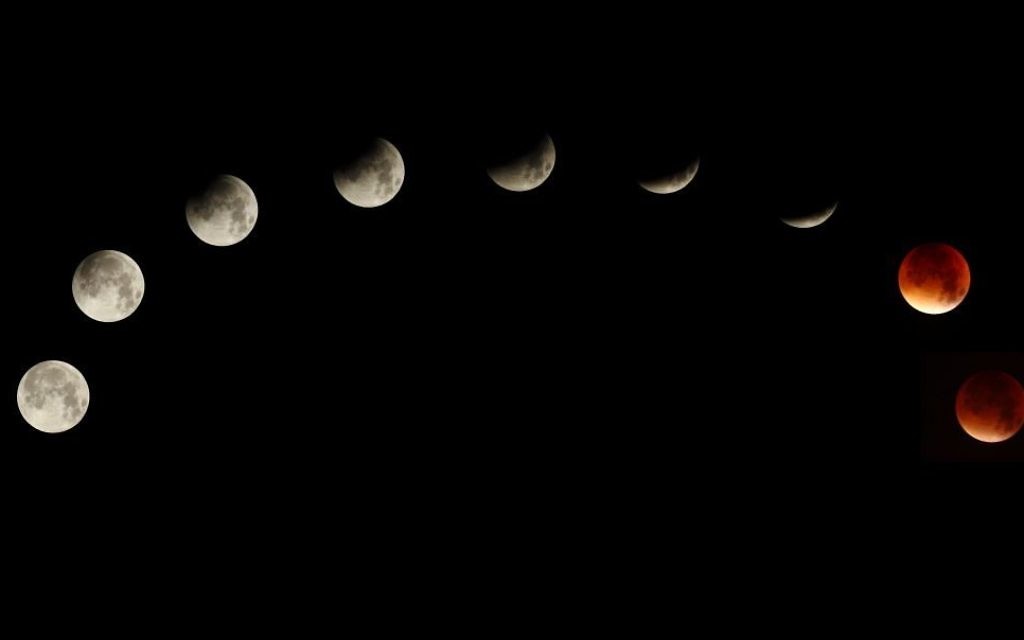Everyday Holiness Is All Around Us
We shouldn't wait for graduations and other special occasions to recognize and appreciate it.

Marbled with gray, the bright orange moon seemed bizarrely large and unreal. Knowing the supermoon was going to be visible in the night sky did not in the least bit prepare me for the overwhelming awe and wonder I felt upon seeing it.
As I shifted my gaze back to the earth, my sense of amazement disappeared. In front of me and behind me were cars and trucks, moving very little. We were late to our evening class at the Marcus JCC, and I felt the stress of the traffic jam that meant it would take at least 10 minutes to exit 285.
Holiness is a big idea and one I often expect to come in a big, notable package. And sometimes it does. Like the giving of the Torah as described in the Bible, or a birth, a wedding, a graduation, a bar mitzvah. It is easy to see these events as holy.
Get The AJT Newsletter by email and never miss our top stories Free Sign Up
Each takes preparation. That preparation breeds anticipation. And then there is the event itself, filled with drama and ritual and awe. Often this type of holiness moves and changes us.
But most holiness, I have found, is more akin to the appearance of the supermoon over a traffic-filled highway on a busy weeknight.
Life is busy. Maybe it’s a modern thing with technology and cars and incredible amounts of information. Who has time to sit and watch the stars when we have to catch up on the newest season of the latest show on Netflix? Besides, who can even see the stars?
But maybe I’m romanticizing the past. For while I’m sure that Sarah our foremother could see the stars through the cracks in the tent she and Abraham pitched outside Be’er Sheva, I doubt that, after a day that included gathering kindling, feeding the goats, cooking food for the family, mending a sock, bartering for some spices, bringing water from the well and washing soiled garments, she had the strength or interest to ponder the wonder that is the night sky.
Into busy Jewish life, ancient, modern or medieval, Judaism drops the obligation of 100 daily blessings. At first glance the obligation to recite so many blessings might seem like another burden. As a child, I certainly experienced it that way.
Time spent in blessing food, for example, was time not spent at recess. Blessings were a distraction I felt I could not afford.
But as an adult, I’ve come to appreciate the rabbinic approach to daily blessings and the understanding it brings to me of holiness.
That night on 285 was busier than most. Dinner had been rushed, and still we were late. Class was delightful, but upon returning home there was homework and emails, dishes and laundry. But in the middle of this business there was the supermoon in all its glory.
The moment might have been swallowed up by the daily concerns, but, instead, my daughter and I said a blessing, taking in the glory, noting the holiness.
Weddings, births and b’not mitzvah are wonderful, but they are rare. Holiness, by contrast, is common but often overlooked. Daily blessings provide us the chance to stop and notice, to take in the moments before they pass and to recognize their value and importance.
In contrast to big-event holiness, everyday holiness hides in the midst of the mundane. The food blessings that I viewed as a burden as a child have been transformed into an opportunity to notice, to remind myself to see this food you are about to eat, really see it, appreciate it, know its value. When I bless, I remember that my hunger and I are not at the center of the universe; there is something bigger and more sacred going on.
If we are open to noticing, rare are the days that are not worth 100 blessings. It may be something simple, like someone holding a door, a kind word from a neighbor or the smell of honeysuckle. Saying a blessing names these things as holy so we do not overlook the holiness that we have.
We need not wait until the baby is born, the wedding dress bought, or even a supermoon expected to experience holiness. In the midst of our busy daily lives, it exists all around us. All that is left is for us, even if only briefly, to notice.




comments